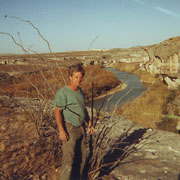
For nearly 30 years Scott Hayes has worked to build his landscaping business. He has worked hard, putting in seven-day weeks for eight months of the year, and building up a reputation through his work and word of mouth. Today, his business in Beverly, Mass. has a steady customer base for three seasons, which gets him through the slower winter months, but Hayes still works long days and weeks, as is the life of the small business owner.
Naturally then, he took issue when President Obama told business owners across America “You didn’t build that.” He did build it on his own, he contends, and he is increasingly concerned with the direction the country is headed, with the perception of capitalism, free markets and business owners.
“Our traditional liberties are seriously under attack,” he said. “If we want to remain a strong and free nation, I think it’s absolutely imperative that we try to take it back, to reclaim it,” said Hayes.
The solution, as he sees it, is to make sure young people have the same appreciation for hard work, personal responsibility and self-reliance—the entrepreneurial spirit—that drives business owners like himself to take a risk and build something on their own. He hopes young people will learn the same things he did—from his parents, from working alongside his father, and through his own experience in business—that “you can have it if you’re willing to get out of bed and go work for it.”
Hayes first heard about the work of The Fund for American Studies (TFAS) in a letter he received from TFAS Trustee Fred Barnes, asking him to help teach today’s college students this same message.
The thing that I like most about TFAS is the way it prepares and teaches young people about the ideas of freedom and capitalism; because I believe in all that. I like the idea of helping young people get started—a good, solid foundation on what this country was founded on.”
“The thing that I like most about TFAS is the way it prepares and teaches young people about the ideas of freedom and capitalism, “ Hayes recalled. “Because I believe in all that. I like the idea of helping young people get started—a good, solid foundation on what this country was founded on.”
That was seven years ago, when Hayes first became involved with TFAS. Since that time—after a recession, two presidential elections, and countless candidates and issues asking for support—Hayes remains firmly behind the idea that today’s young people are the solution to our country’s future.
He thought a long time, he said, about these ideas and about how he could make a difference for the next generation through his own work. This past year, Hayes made the decision to take his support a step further. He joined the TFAS Legacy Society by adding TFAS to his estate plan. It was a big decision, but one that he felt strongly about. “I like what TFAS does. I’d rather give my money to a good cause than have the government take their share and waste it,” said Hayes. “I truly believe that we need to reach out to young people and prepare them for a good future.”
In addition to starting his business—an idea he got from his father, who worked a second job for a landscaping company when he was growing up—Hayes taught himself how to invest, initially from a book he ordered in the mail. “I used to get up at three in the morning, to study and study and study,” he said, about how to analyze a company, how to pick out the profitable ones from the busts. It’s become a hobby of his and a point of pride.
It ties into his larger philosophy as well. Hayes credits his parents for instilling in him his values and work ethic, and also the friends, colleagues and customers he has known along the way who encouraged him and gave him a chance to succeed. But ultimately, he said, he bore the risks himself, whether in the financial markets or in his business; that is what got him where he is today and in a position to help organizations like TFAS make the difference.
He enjoys his work, he enjoys keeping up with stock markets and current affairs, and when he has some time in his busy schedule, he enjoys getting away to raft the Rio Grande. But he also sees a larger purpose in the work he is doing, and the opportunities that afford him to make charitable gifts. “For eight or nine months out of the year, I get up, I go to work, I come home,” he said. “It gives me purpose to get up and go to work every day. Because at least I know I’m helping. I just want to try and help out.”

